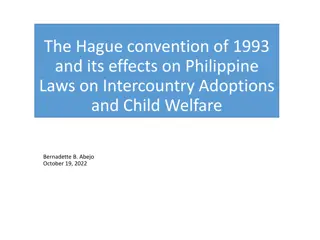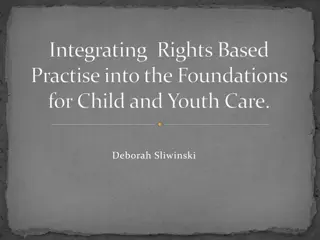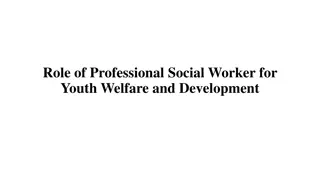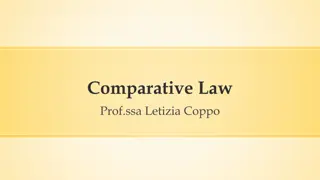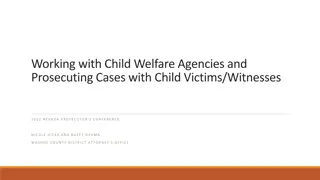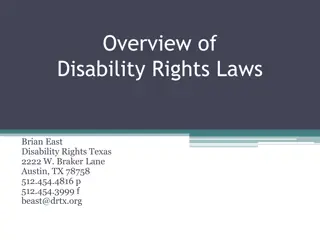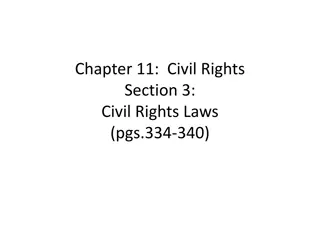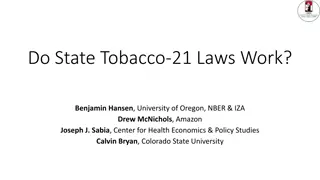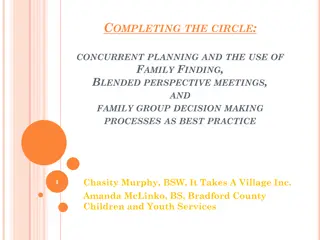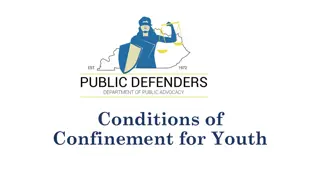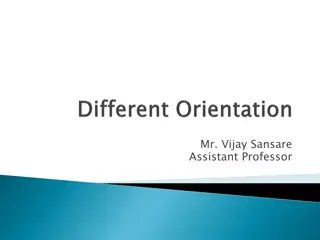Youth Rights and Normalcy: Understanding Federal and State Laws in Child Welfare
Exploring the importance of Youth Rights and Normalcy in the context of federal and state laws within Child Welfare. The content covers topics like Reasonable & Prudent Parenting Standards, Youth Rights, Legal Frameworks, and the significance of providing a sense of normalcy to children and youth in foster care.
Download Presentation

Please find below an Image/Link to download the presentation.
The content on the website is provided AS IS for your information and personal use only. It may not be sold, licensed, or shared on other websites without obtaining consent from the author.If you encounter any issues during the download, it is possible that the publisher has removed the file from their server.
You are allowed to download the files provided on this website for personal or commercial use, subject to the condition that they are used lawfully. All files are the property of their respective owners.
The content on the website is provided AS IS for your information and personal use only. It may not be sold, licensed, or shared on other websites without obtaining consent from the author.
E N D
Presentation Transcript
ADD PRESENTER NAME, TITLE, AGENCY INFO
AGENDA Federal & State Laws Reasonable & Prudent Parenting Standards What It Covers Non-Negotiables Youth Rights Responsibilities Grievance Process Personal Action Plan 3
Learning Objectives Identify the federal and state laws and Child Welfare policy reference supporting implementation of the RPPS and Youth Rights Define the RPPS; and know how it is applied. Be familiar with the list of youth rights and responsibilities and the grievance process Have identified personal practice areas that need to be adjusted as a result of RPPS and Youth Rights policies. Have developed an action plan to share the RPPS and Youth Rights policies within personal area of influence. Know where to find additional resources on RPPS and Youth Rights 4
Federal & State Laws Preventing Sex Trafficking and Strengthening Families Act (2014) Senate Bill 138 Georgia s Child Welfare Reform Bill (2015) 6
Preventing Sex Trafficking and Strengthening Families Act (2014) Senate Bill 138 Georgia s Child Welfare Reform Bill (2015) 7
The Goal: Normalcy Participate in routine activities Continued focus on permanency Applies to all Children and youth in foster care Placement settings 8
Normalcy: Why Does It Matter? The youth Learns their interests and talents Safely experiments Practices decision-making Develops healthy peer relationships Develops a different relationship with adults; views them as life guides instead of wardens . The caregiver Learns the youth s strengths and needs Develops more trust and confidence in the youth as well their own parenting abilities. Is relieved of some care pressures as the youth becomes from independent. 9
Normalcy Empowering foster caregiver to make routine, typical parenting decisions without having to go through administrative approvals. Eliminating barriers to youth participating in extracurricular, social enrichment, cultural and social activities. Ensuring that the child welfare system keeps safety paramount while not unnecessarily sacrificing normalcy for children and youth. 11
Discussion What are some of the characteristics of a reasonable and prudent person? 12
Reasonable and Prudent Reasonable and Prudent Person a fictional person who exercises the standard of care that a reasonable prudent person would observe under a given set of circumstances. Reasonable and Prudent Parent Standard the standard characterized by careful and sensible parental decisions that maintain the health, safety, and best interests of a child while at the same time encouraging the emotional and developmental growth of the child, that a caregiver shall use when determining whether to allow a child in foster care under the responsibility of the State to participate in extracurricular, enrichment, cultural, and social activities. 13
Reasonable and Prudent Parent The reasonable and prudent parent exercises average care, skill, and judgment in their parenting decisions and conduct. 14
How to Make a RPP Decision A reasonable and prudent parenting decision requires that a caregiver consider the factors unique to each child such as age, ability, maturity, history, in-put from case managers and service providers, parenting experience, length of time of placement , past behaviors, known pre-cautions and any other relevant factors that would yield a reasonable and prudent decision. 15
Responsibilities of the DFCS/CPA/CCIs 1. Child information is shared with caregivers. Child-caregivers are well-matched. Caregivers are well trained to meet the needs of children placed. The agency/Department may not create rules, standards or policies which limit, prevent or create barriers to caregivers making reasonable and prudent parenting decisions within the boundaries discussed. Each child in care has ongoing opportunities to engage in age and developmentally appropriate activities. 2. 3. 4. 5. Result: Normalizes children s lives to the extent possible Improves the satisfaction and retention of caregivers Positive impact on placement stability. 17
Starting October 1, 2015 Family Foster Homes (DFCS, CPA) Relative Placements Group Homes 18
Group Homes (CCIs) Group homes must have at least one RPP designee but it is recommended that at least two are designated to ensure that decisions are not delayed to due the RPP s absence. The designated RPP must meet the following requirements: 1. Be in the role of Human Services Professional or higher leadership position. 2. Must be at least 25 years of age or 10 years older than the youth. 19
RPPS applies: Day to Day and routine/typical caregiver decisions Permission to participate in age and developmentally appropriate school, extracurricular, sports, social/cultural enrichment, field trips and similar activities 20
Caregivers must keep notes to share during regularly scheduled case manager contacts. 21
Babysitters Retention Alert! Prepared and able to meet the needs of child Must be screened and approved by the case manager (routine) 18 years old 22
Unsupervised Youth GIP Not Required, But Recommended 23
Q & A Press 1-0 If You Have A Question or Use the Chat Area to Type Your Question/Comment
Non-Negotiables Discipline Policy Changing Schools ILP Drastic change of child s appearance Medications Changing the Religion Court order-general Sibling Visits Court Order Visitation Medical Approvals-other Return child without court approval 25
Working with foster parents, birth parents have the opportunity to demonstrate and build parental competence. RPPS Being able to participate in age and developmentally appropriate activities is a key component of healthy development for children and youth. Permanency Foster caregivers are empowered to make reasonable and prudent parenting decisions for the children and youth entrusted to their care. Partnership Parenting Safety, as always, remains paramount. 26
Training Recap RPPS applies to all foster caregivers and all placement settings; groups homes are not exempt. Implementation of RPPS and YR is required by federal and state law. The policies are effective 10/1/2015. RPPS applies to routine and typical parenting duties but there are areas or non-negotiables where it does not apply. RPPS and Partnership Parenting are complementary objectives. Each CCI must designate an acceptable staff person to be their RPPS. RPPS supports the healthy growth and development of children and youth. Includes civil liability protection; and protection from PVs and CPS substantiations. DFCS/CPAs/CCIs are accountable. 29
Q & A Press 1-0 If You Have A Question or Use the Chat Area to Type Your Question/Comment
Law and Policy Preventing Sex Trafficking and Strengthening Families Act (2014) Senate Bill 138 Georgia s Child Welfare Reform Bill (2015) Child Welfare Policy 13.17 32
Youth Rights 1. The right to fair and equitable treatment by the Division of Family and Children Services (DFCS), foster parents, and other partners in the care of children in foster care; 2. The right to information regarding their heritage and cultural background; 3. The right to be safe from abuse, neglect and exploitation; 4. The right to know why they are in the child welfare system; 5. The right to have their educational needs met; 6. The right to have their health needs met; 7. The right to family and community connections, including visitation, telephone calls, etc. ; 33
Youth Rights 8. The right to have regular, ongoing opportunities to engage in age or developmentally appropriate activities as defined in O.C.G.A. Section 49-5- 3; 9. The right to have intensive, ongoing efforts made to reunify them with their birth family (i.e. parents or relatives) or to secure a safe, permanent home; 10. The right to participate in the development of the case plan and to review, sign, and receive a copy of the case plan (see 10.23 Foster Care: Case Planning); One member of the case planning team may be designated to be the youth s advisor/advocate, with respect to the application of the reasonable and prudent parent standard to the youth; 11. The right to choose up to two members of the case planning team who are neither their foster parent nor caseworker ; 34
Youth Rights 12. The right to participate in Juvenile court proceedings regarding their family; 13. The right to receive the services needed to help them transition to adulthood; 14. The right to receive a free copy of their consumer credit report (see 13.6 ILP: Credit Reports for Youth in Foster Care); 15. The right to receive an official or certified United States birth certificate, Social Security card, driver s license or identification card, health insurance information, and medical records upon exiting foster care at age 18 or above ; and 16. The right to receive an age appropriate description of their rights, and a personal copy. 17. The right to have a personal advocate to support them through the grievance process. 35
Questions 36
Youths Grievance Process Step One Grievance: Submit a written complaint electronically to the Independent Living Specialist (ILS) explaining which of their rights they feel have been violated and how. The ILS, in consultation with the local DFCS County Director and Region Director, will investigate the complaint and issue a written response to the youth within 10 business Email address is needed. ILP has 10 days to send a written response to youth regarding the complaint with input from county/region Youth submit an electronic compliant to ILS (via ILP website) 37
Youths Grievance Process Step Two Grievance: If the complaint is not satisfactorily resolved within 10 business days from the date the complaint is received by the ILS, submit a written complaint to the DFCS Division Director along with a copy of the original complaint filed with the ILS, the written response, and any other pertinent documentation to NOTE: If the Step Two Grievance is not filed within 10 business days of the response from the Step One Grievance, the grievance is considered closed. ILP has 10 days to send a written response to youth regarding the complaint with input from county/region Youth submit an electronic compliant to ILS (via ILP website) Division Director will have 15 days to make a decision 38
What is the difference between a Right, a Responsibility and a Privilege? 40
A right is a freedom that is protected, such as the right to free speech and religion or in this case Youth in Foster Care Rights. A responsibility is a duty or something you should do, such as recycling or doing your homework. A privilege is a special entitlement that is time-limited, not guaranteed and can be taken away. It is generally a reward or condition for good behavior. 41
Youth Responsibilities 1. The responsibility to treat themselves and others with dignity and respect; The responsibility for their own choices, decisions, actions and behaviors; The responsibility to try to learn from their mistakes so they can make positive choices in their lives; The responsibility to try to the best of their ability in school, to take full advantage of educational opportunities and achieve their educational needs; The responsibility to cooperate with services recommended to meet their health needs; 2. 3. 4. 5. 42
Youth Responsibilities 6. The responsibility to set and keep safe boundaries with family members, friends, acquaintances, and others with whom they maintain connections; 7. The responsibility to do their best to communicate openly with others when they have a problem; 8. The responsibility to ask for help when they need it, even when they have trouble asking for help; and 9. The responsibility to make amends if their actions harm others. 10. The responsibility to make every effort not to cause harm to themselves or others and to speak up when they feel their rights have been violated. 43
Paradigm Shift # 1: Ensuring safety must remain a priority however it must be considered in an age- and developmentally-appropriate context. Paradigm Shift # 2: Caregivers will be empowered to make reasonable and prudent parenting decisions rather than navigating through multiple levels of permission, authorizations to do the things that most parents routinely allow their children to do. 46
RPPS Activity RED --Non-negotiables YELLOW this is a gray area; a decision that should be discussed in advance with the agency/Department GREEN--Falls within the RPPS 48
Scenarios RED RPPS DOES NOT APPLY GREEN RPPS APPLIES YELLOW CONSULT AGENCY (GRAY AREA) A foster caregiver would like to get a babysitter so she can attend a local concert. She has two children ages 6 and 4 placed in her care. A 15 year old would like to make a long distant phone call to her aunt; the foster parent does not allow long distance calls (no cell phone-land line). A 16-year old in ACME CCI would like to attend a 2-night ski trip with his church group. A relative caregiver would like to take her kin placement to Disney for 4 nights. The foster parents go on a getaway weekend and leave their two foster children ages 13 and 9 with the foster parent s parents. A foster parent asks her 18 year old foster daughter to babysit two other foster children is very capable of providing the care. A 16 year wants to get on birth control. The foster parent agrees, the birth mom does not. A 17 year old wants to get a job. ACME group home requires that youth be closely supervised at all times; they routinely deny requests to do age appropriate activities including going to the mall or school games. A foster parent is a holistic healer of sorts. She does not believe in western medicine for herself or her children. She decides not to follow a doctor s medical orders for a foster child in her care. 49
YRR Activity RED Rights Violation YELLOW this is a gray area; a decision that should be discussed in advance with the agency/Department GREEN No Violation 50






